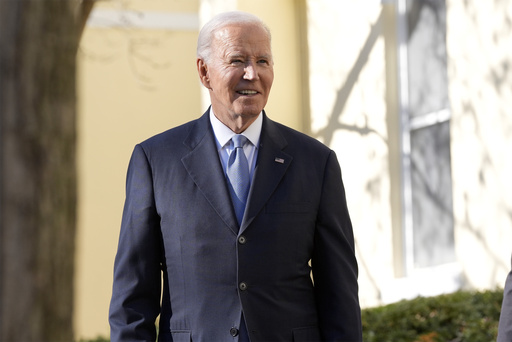
WASHINGTON — President Joe Biden revealed on Friday that he has commuted the sentences of nearly 2,500 individuals convicted of nonviolent drug offenses, taking advantage of his last days in office to execute a series of clemency actions aimed at addressing what he considers excessively punitive prison terms. This latest initiative boosts Biden’s record for the most individual pardons and commutations by a U.S. president, as he aspires to rectify what he perceives as disproportionately long sentences that contrast with those that would be handed down under current laws and policies.
In a statement, Biden emphasized that this clemency initiative is designed to alleviate the burdens faced by those who received harsh sentences due to outdated and discredited distinctions between crack and powder cocaine, along with obsolete sentencing enhancements related to drug offenses. “This action is an important step toward righting historic wrongs, correcting sentencing disparities, and providing deserving individuals the opportunity to return to their families and communities after spending far too much time behind bars,” he said. Hours later, the White House made public the names of the 2,490 individuals benefiting from the commuted sentences. Biden indicated that additional commutations and pardons could be forthcoming before President-elect Donald Trump is inaugurated on Monday.
Kara Gotsch, the executive director of The Sentencing Project, commented that those who were sentenced under the older crack cocaine laws had already paid their debts. “Cruel and excessive prison sentences that have overwhelmingly harmed Black communities have been the cornerstone of federal drug policy for generations. Today’s commutations from President Biden are a welcome relief for countless families who have endured punishments for loved ones that far exceed their utility,” Gotsch explained.
This move by the Biden administration comes at a time when the president is contemplating the issuance of broader pardons for supporters and officials who may face unjust scrutiny under Trump’s incoming administration. Although the power to pardon is complete within the presidential prerogative, a preemptive act of this nature represents an innovative and potentially contentious application of this constitutional authority.
Shaneva D. McReynolds, president of Families Against Mandatory Minimums (FAMM), remarked that Biden “is leaving office with a lasting legacy on criminal justice reform.” In her statement, she noted that today’s announcements elevate the standards for presidential clemency while addressing long-standing issues within the criminal justice system.
Sarah Gersten, executive director and general counsel of the Last Prisoner Project, expressed that the president’s recent actions bring “hope — not just for those freed today, but for all individuals still incarcerated for cannabis and their families that have been impacted by the War on Drugs.” This announcement follows previous commutations made last month, where Biden released around 1,500 people from prison who had been on home confinement during the COVID-19 pandemic, in addition to pardoning 39 individuals convicted of nonviolent crimes. This marks the largest single-day clemency act in contemporary history.
Last month, Biden also commuted sentences for 37 of the 40 individuals on federal death row, shifting their sentences to life imprisonment shortly before Trump, a known advocate for expanding capital punishment, assumes office. Biden has expressed concerns over potential retaliatory actions against his son, Hunter, and recently announced a pardon for him regarding federal gun and tax law violations, as well as any potential federal offenses that may have occurred during an 11-year period.
Given past precedents, it is plausible that Biden will continue to issue selective pardons for allies as he prepares to leave the White House, a maneuver often witnessed by outgoing presidents. For instance, in the twilight of his first term, Trump, a Republican, approved a wide range of pardons and commutations for over 140 individuals, including his former chief strategist Steve Bannon, as well as well-known figures like rappers Lil Wayne and Kodak Black.
Trump’s final act before departing office in his first term was the pardon of Al Pirro, the ex-husband of Fox News personality Jeanine Pirro, a vocal supporter of Trump. Al Pirro had faced charges of conspiracy and tax evasion, leading to a prison sentence exceeding two years in 2000.

